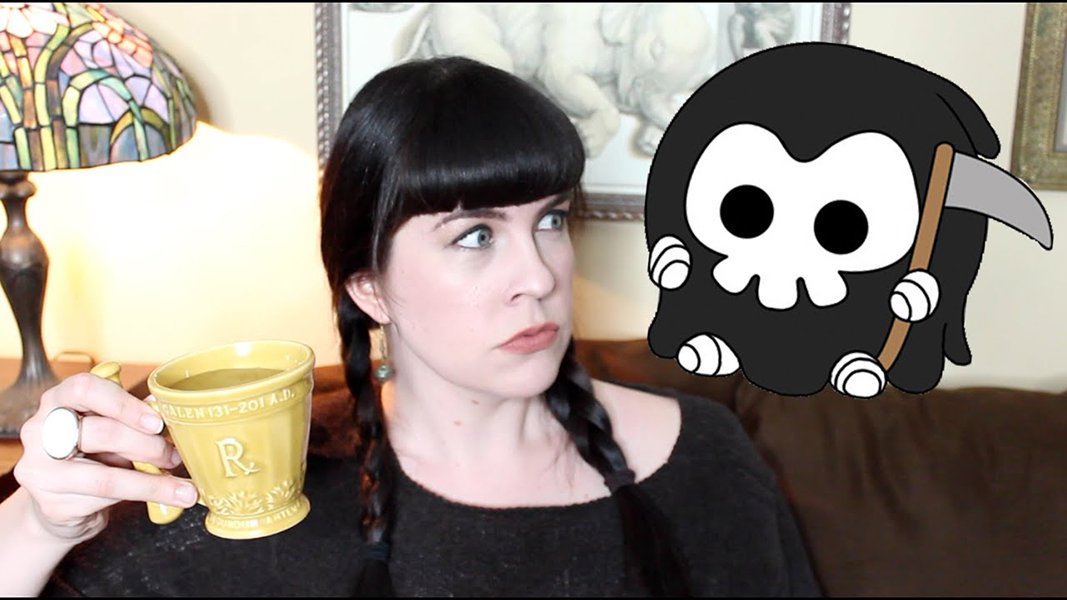Ask a Mortician is the name of a YouTube channel run by Caitlin Doughty, who is — you guessed it — a mortician. A funeral industry professional for 14 years and the proprietor of her own funeral home in Los Angeles, she answers common questions on her channel about death and the death industry.
Doughty is, as she puts it, death-positive. Without context, this sounds like something a serial killer might put in his “about me” section on Tumblr, but in practice it means that Doughty aims to weaken the taboo against talking about death in North America by dispelling the myths and misconceptions that many of us have internalized about death, dead bodies, and funerals. Doughty also works to desensationalize tragedies and non-mainstream death practices, and her video series, “Iconic Corpse,” is devoted to humanizing people whose corpses are widely known, but whose lives — and wishes for their corpses — aren’t.
Ask a Mortician’s goofy thumbnails and attention-grabbing video titles, many of which are at least partly in all caps, reflect Doughty’s enthusiasm for the subject matter, but she invariably approaches each topic with a staunch sense of empathy and respect — and a sense of humour.
I’ve watched Ask a Mortician for almost two years, and the more I’ve learned, the more opinions I’ve developed about death, like what I want to happen to my body and what I think about common death practices. Doughty champions the idea that everyone, not just death industry professionals, are able to make good decisions about death and should be able to be as involved as they want to be. I became comfortable thinking and talking about death, but I was only doing it hypothetically. When I became death-positive, I hadn’t experienced losing a person I actually knew. Secretly, I wondered if my comfort was just bravado that would fall away instantly when I was faced with the death of a loved one.
And then my grandmother died. And I was fine.
My dad called from the hospital late at night, and I took the bus home to Chilliwack the next morning. I hugged him, asked if he knew what Granny had wanted to be done with her body, and offered to call the funeral home. Because of Ask a Mortician, I felt able to take this responsibility off of people who were grieving more than me — my dad for his mom, and my grandpa for his wife of over 60 years. I not only had basic knowledge of the funeral industry and our rights within it, but I had the emotional wherewithal to directly and calmly ask my grandfather what he wanted to do with my grandma’s body. Having reassurance from Doughty in the back of my mind that it wasn’t wrong to ask those questions meant that, while I was grieving for my grandmother, I could process the things that couldn’t wait for that grieving to be done.
A few days after she died, my grandpa asked me to move some photos from his flip phone to his laptop and save them to a certain folder. When I pulled up a photo he had taken of my grandmother’s body, he said, quickly and quietly, “I don’t know why I did that. I shouldn’t have done it.”
My first instinct as someone from a society where death is kept behind closed doors was to be taken aback, even disgusted, but I didn’t say that. I said what I knew from learning that there are more — and sometimes better — ways to handle death than what you can buy at your average funeral home: “It’s okay.”
As Ask a Mortician has gained more funding and followers, the channel has moved far beyond Doughty sitting in her oddity-filled apartment and talking to the camera; while combating death, denial underpins all of Doughty’s work. She has content for history buffs as well as the modern death enthusiast. Some videos, like “The Donner Party: What Really Happened?” and “Salem Witch Trials- NEW Revelations” are shot on location at sites of famous deaths, and she also does more interactive videos, like “Mortician Does My Makeup for the Casket,” and “We Recreated a Victorian Funeral,” with other death professionals and researchers. Doughty’s videos are thorough and well-researched, often offering fresh perspectives on topics that are widely known but poorly understood, like the Columbine High School shooting and the suicides in Aokigahara.
Watching Ask a Mortician didn’t make it easy to lose my grandmother, and it didn’t make me a perfect mourner or a perfect daughter or granddaughter. But, it helped. Doughty’s videos are accessible and engaging as well as informative, and her commitment to helping people is at the forefront of all of her work. If you’re expecting the death of someone close to you, if you want to be as prepared as you can be for an unexpected death, or if you just have a natural curiosity about death that our culture says you should keep quiet, you need to be watching Ask a Mortician


